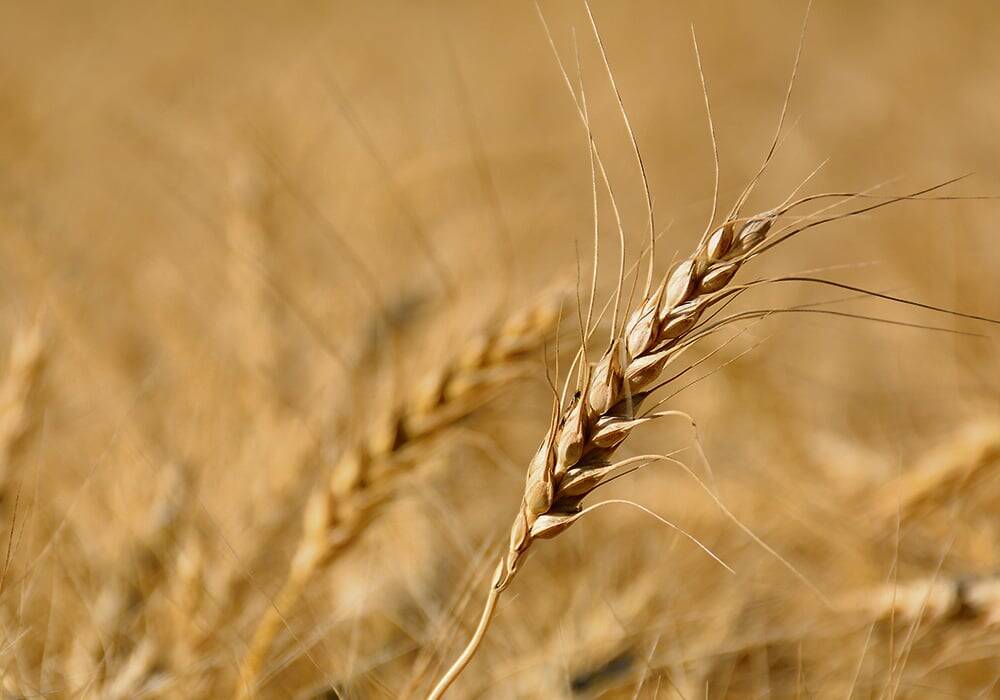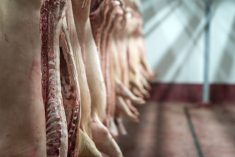Washington’s proposed regulatory changes on its mandatory country-of-origin labelling (COOL) laws for some foods sold in the U.S. are expected to pile more financial damages per head on Canada’s cattle and hog sectors.
Filing their comments Thursday with the U.S. Department of Agriculture’s Agricultural Marketing Service (AMS), the Canadian Cattlemen’s Association (CCA) and Canadian Pork Council (CPC) both predict the U.S. government’s planned revisions to COOL “would only escalate the level of discrimination and cost to livestock producers in Canada and Mexico.”
“In Canada, it is estimated that the proposed rule would significantly increase damages from COOL beyond the current impact of $25 to $40 per head,” the CCA said in a release.
Read Also

Prairie CWRS bids rise, other wheats mixed
Canada Western Red Spring (CWRS) wheat bids across the Prairie provinces saw some strength during the week ended Nov. 11, taking some direction from the United States futures. However, other wheat classes were mixed.
The World Trade Organization (WTO) has given the U.S. until May 23 to bring COOL into compliance with international trade rules or face possible retaliatory action from Canada and Mexico.
To that end, the U.S. government last month proposed a revised set of COOL rules which, if passed, will require even more specific labels for meat according to individual steps of production.
Noting a 2003 version of AMS’s proposed COOL rule which was “virtually identical” to the latest proposed changes, the CCA on Thursday cited research done at that time by Sparks (now Informa) which found the COOL-associated costs for cattle under that rule would have run around $5.10 per hundredweight — before adjusting for the 23 per cent inflation built up between then and now.
“Those costs are similar to, but larger than those found in the later Informa study pertaining to the regulations currently in place,” the CCA said in its comments Thursday to AMS, just ahead of the end of Washington’s public comment period on the proposed rules.
Under the proposed changes the costs for hogs would be even larger than those for cattle as a proportion of carcass value, the CCA said,
Informa later found that COOL, in its current form, imposes “differential costs” on imports per hundredweight from Canada, in the range of $4.50 for fed cattle, $2.50 for feeder cattle, $5.80 for fed hogs and $3.10 for feeder pigs.
Since COOL tasked U.S. feeders, packers and processors with segregating by country of origin and labelling, the costs “were shown to be high enough for many (U.S.) buyers to shift away from imports altogether and for others to demand and receive significant price discounts to allow them to remain competitive,” the CCA said.
“Statutory, not regulatory”
As for the proposed regulatory changes, the CCA said in its comments, there’s been “no explanation of how the proposed rule would bring the current mandatory COOL requirements into compliance with U.S. international trade obligations, merely a statement that AMS ‘expects’ it will do so.”
The CPC added Thursday it also believes Washington’s proposed new rule “will not remove discrimination found by the WTO panel but will only serve to make it worse by increasing the level of discrimination against imported livestock.”
First conceived in Washington’s 2002 Farm Bill and launched in September 2008, mandatory COOL orders U.S. retailers to notify their customers, by way of labeling, on the sources of foods such as beef, veal, pork, lamb, goat, fish, fruits, vegetables, peanuts, pecans and macadamia nuts.
Canada and Mexico successfully challenged COOL at the WTO’s Dispute Settlement Body in 2011 — a decision upheld last year by the WTO’s Appellate Body.
Those rulings found COOL violates the WTO’s Agreement on Technical Barriers to Trade (TBT), breaches Washington’s WTO obligations and “does not fulfil its legitimate objective” of consumer education, also noting “a considerable proportion of meat sold in the United States is not subject to the COOL measure’s labelling requirements at all.”
The WTO Appellate Body “was clear that the discrimination caused by COOL stems from the fact that different labels are required for meat from cattle and hogs exclusively born, raised, and slaughtered in the U.S. than for meat from cattle and hogs born or raised in another country,” the CPC said Thursday, adding it will take more than regulatory tweaks for the U.S. to fix the law.
“As these labelling requirements are statutory, it is a statutory, not regulatory, change that is needed to mitigate their discriminatory effect.”
Related stories:
WTO appeal body upholds ruling against COOL, June 29, 2012
Canada rips USDA’s plan for more specific COOL labels, March 8, 2013
Ritz sees up to $1B per year in COOL retaliation, April 9, 2013













